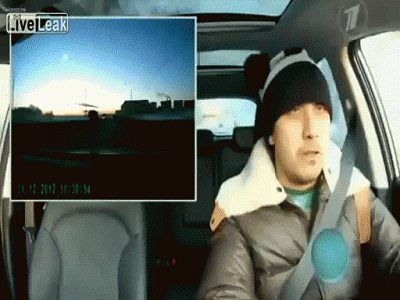I don't think nuclear blasts are necessary. If you can detect them early enough, land a rocket on it and start pushing it off course for some hours or days. Even a relatively small push, should nudge it a few degrees out of a collision course, but you need to do it as early as possible. After all, earth is pretty small, easy to miss 😉
jan
If the thing is a few Km i guess that rocket propulsers wont be enough
and the only working pusher would be one or several thermo nuclear devices ,
ultimately the russian Tsar Bomba design in its full power unreleased version
would find itself being the savior of mankind.
On one of the videos you can hear the sonic boom(s). I haven't yet seen a video whereby one could count the seconds & do a rough calculation as to the distance. The were several "explosions" in the video, not just one big one....a string of them, of varied intensities & timings. Truely a once in a lifetime celestial event. I got to see the comet Hyukataka in all its glory on a crystal clear cold night in 96....the thing covered nearly the entire sky, once in a lifetime.
______________________________________________________Rick.........
______________________________________________________Rick.........
This one has audio but it's only as good as the camera mic so...
Russian meteor: Incredible new blast audio | The Sun |Video|News
Russian meteor: Incredible new blast audio | The Sun |Video|News
I have always wondered about how powerful a meteorite would be impacting our planet, seeing how powerful this little one was,
WOW..! 😱
Imagine if a larger one was to hit Washington DC, wow the devastation, we are very lucky ...
WOW..! 😱
Imagine if a larger one was to hit Washington DC, wow the devastation, we are very lucky ...

Last edited:
I don't think nuclear blasts are necessary. If you can detect them early enough, land a rocket on it and start pushing it off course for some hours or days. Even a relatively small push, should nudge it a few degrees out of a collision course, but you need to do it as early as possible. After all, earth is pretty small, easy to miss 😉
jan
If it's solid, thats fine. If it's a gravity held accretion, push too hard and it falls apart. I suspect it would take a very long time using a very small force. One concept is to use the mass of the spacecraft a small distance from the object, with the rockets keeping the spacecraft away. Gravitational attraction would slowly pull an aggregate object.
Nasa knew about the near miss a long time ago, but I think the meteor caught everybody pants down..
I read the meteor was the equivalent of 20 hiroshima sized bombs? Whoa.😱
jn.
If it's solid, thats fine. If it's a gravity held accretion, push too hard and it falls apart. I suspect it would take a very long time using a very small force. One concept is to use the mass of the spacecraft a small distance from the object, with the rockets keeping the spacecraft away. Gravitational attraction would slowly pull an aggregate object.
Nasa knew about the near miss a long time ago, but I think the meteor caught everybody pants down..
I read the meteor was the equivalent of 20 hiroshima sized bombs? Whoa.😱
jn.
I doubt they never knew this one was coming in , why the radio silence..?
Seems to me breaking it apart would be just as good. Smaller rocks should burn up on entry to the atmosphere.
I doubt they never knew this one was coming in , why the radio silence..?
Of course they didn't. Meteoroids don't follow an orbit like Asteroids do and they are too small for anyone to have their telescope on.
Seems to me breaking it apart would be just as good. Smaller rocks should burn up on entry to the atmosphere.
I agree, but I don't think we want to use nuclear. The meteorite particles would be contaminated.
I'm sure deflection would be best. But if it comes to breaking something up...
the impact of 100 comparatively small rocks evenly spaced across even 0.001 second would be so much less than 1 huge rock hitting at once.
the impact of 100 comparatively small rocks evenly spaced across even 0.001 second would be so much less than 1 huge rock hitting at once.
Lets build a gigawatt audio power amp, connect it to the giant sound beam transmitter and bang them with sonic boon to turn them into fine dust during their entry into our atmosphere.
I like both of those last two posts. 😀
The dude nonchalantly pops the visor down as if it is something that happens every day 😉
There is one video that has amazingly clear audio of the boom and its effects on glass. Note all the windows are pushed in, that was some over-pressure.
RUSSIAN METEORITE - EXPLOSION CAUGHT ON FILM - *VOLUME WARNING* - YouTube
Also, something fun to play with
http://www.purdue.edu/impactearth
Last edited:
The media & NASA had said that the two events(Close flyby & meteor) were un-related.....I would tend to think they are related. The one and only reason given by the authorities was " The meteor came from a different direction".
I would contend that the two 'Tennis court size' & ' SUV size' were a binary pair in orbit, the smaller got captured by Earths gravity,
___________________________________________________Rick..........
I would contend that the two 'Tennis court size' & ' SUV size' were a binary pair in orbit, the smaller got captured by Earths gravity,
___________________________________________________Rick..........
Attachments
I also thought about that, but may be I don't know what NASA scientists know. Also, such meteorites now are called like Russian equivalent of "Holly F**k" saying. 🙂
- Status
- Not open for further replies.
- Home
- Member Areas
- The Lounge
- Meteor in Russia...

